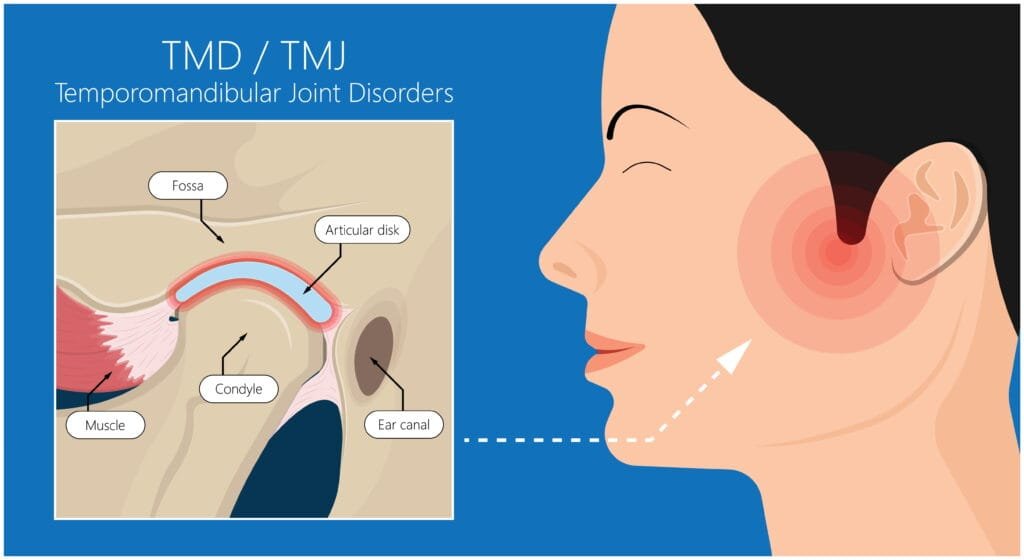Expert TMJ Injection Therapy
Prices are inclusive of assessment, ultrasound scan and ultrasound guided injection
What is TMJ Pain?
TMJ pain refers to discomfort or dysfunction in the temporomandibular joint – the hinge joint that connects your jaw to your skull. You have one on each side of your head, just in front of your ears. These joints help you talk, chew, and yawn, so when something goes wrong, it can really affect your daily life.
TMJ pain, also known as temporomandibular joint disorder (TMD), is surprisingly common and can cause pain in the jaw, face, ears, or even the neck and shoulders.
At Complete, we have a team of TMJ specialists, led by Sports Medicine Consultant, Dr Matteo Bernardotto, who offers expert diagnosis and advanced TMJ injection treatments that will give you excellent pain relief and help improve your quality of life.
Anatomy of the TMJ

Temporomandibular Joint Disorders TMD TMJ treat pain displaced disc temporal bone locking bite plate plastic guard night Transcutaneous electrical nerve stimulation TENS Arthroscopy occlusal
The temporomandibular joint is a complex structure that allows both hinging and sliding movements. It’s made up of:
- The mandible (lower jaw)
- The temporal bone of the skull
- A cartilage disc that acts as a cushion between the bones
- Surrounding muscles, ligaments, and nerves
Because the joint is used so frequently and is structurally quite intricate, it’s prone to strain and dysfunction.
Common Causes of TMJ Pain
TMJ pain can be triggered by several factors, and is usually a combination of a few different things. The most common factors include:
-
- Teeth grinding or clenching – This can cause an overuse of the jaw muscles and is often linked to stress.
- Jaw misalignment – Caused by dental issues such as an over or underbite, or following dental treatment or surgery.
- Trauma or injury – A fall or direct injury to the jaw, chin or side of your face can be a trigger.
- Lifestyle habits – Such as chewing gum or biting your nails – again these are signs of increased stress.
- Joint conditions – Like Arthritis or joint changes caused by wear and tear on the disc or joint surfaces.
- Poor posture – This is a very common contributing factor to TMJ pain. Slumped sitting posture, with poor alignment of the chin, neck and shoulders, particularly affects the TMJ.
Sometimes, no clear cause can be found, which can be frustrating but is not uncommon.
Symptoms of TMJ Dysfunction
TMJ pain can vary between each individual, and it doesn’t always stay local to the jaw.
Common symptoms include:
- Local aching or sharp pain around the jaw joint, on one or both sides.
- Clicking, popping or grinding sounds when opening the mouth, or chewing.
- Restricted jaw movement, stiffness or locking – difficulty fully opening your mouth.
- Ear pain, fullness or ringing in the ears (without ear infection.)
- Headaches, especially around the temples.
- Pain while chewing, yawning, singing or speaking
Often symptoms start gradually, and may come and go initially, but become more persistent over time. They can also come on quite suddenly, especially if due to trauma, or injury.
How is TMJ pain diagnosed?
There’s no single test for TMJ disorder, but diagnosis usually involves:
- A thorough clinical assessment of your jaw movement and facial muscles
- Asking about your symptoms, lifestyle and any history of injury or dental issues
- Sometimes imaging such as MRI or ultrasound is used to look at the joint structure
At Complete, our specialists take the time to understand your full picture before recommending a treatment plan.
Treatment Options for TMJ Pain
Almost all cases of TMJ pain can be managed effectively with non-surgical treatments. These fall into a few categories:
-
Physiotherapy and Jaw Exercises

While our focus here is injections, we always recommend that physiotherapy is your first line of treatment for TMJ. Specialist physiotherapy can help many patients by improving jaw alignment, reducing muscle tension, and teaching relaxation techniques.
Physiotherapy treatment may include:
- Relaxation techniques and lifestyle advice to reduce anxiety and stress
- Posture correction – sitting/standing posture or ergonomic assessments
- Manual therapy – Joint mobilisations of the cervical spine and jaw
- Soft tissue release around the jaw, neck and shoulders
- Neck and jaw coordination exercises
- Muscle strengthening exercises for the neck and jaw
- Mewing – This is a specific exercise working on your tongue and jaw position.
-
Steroid Injections (Targeted Relief)
Led by Dr Matteo Bernardotto, Complete Injections provides ultrasound-guided injection therapy to accurately target and treat TMJ dysfunction.
If your pain is persistent or flares up frequently, and has not settled with focused physiotherapy treatment, or is too painful for you to engage fully in a physio treatment plan, then a corticosteroid injection into the TMJ could be the best next step for you.
Steroid injections are ideal if your pain is clearly joint-related (rather than purely muscular), and if other treatments have not been successful.
These injections can help to reduce inflammation and pain, allowing you to have a pain free period, so that you are able to re engage in a targeted, physio led treatment plan.
This procedure is done under ultrasound guidance for precision.
What to expect:
- The injection is quick and usually well-tolerated
- Relief can start within a few days
- Effects can last several weeks or even months
- We recommend that you combine an injection with ongoing physiotherapy for the best long-term outcome.
Are TMJ Injections Painful?
This is a common concern. Most patients describe the injection as a little uncomfortable, but not painful. A local anaesthetic is used to numb the area, and the procedure is usually done in under 20 minutes. You may have some mild soreness or stiffness afterwards, which usually settles quickly.
What are the risks or side effects?
Side effects from TMJ injections are uncommon but can include:
- Mild swelling or bruising
- Temporary increase in pain
- Rarely, infection or allergic reaction
We’ll talk you through everything beforehand so you can make an informed decision.
What happens after the injection?
You can usually return to normal activities the same day, although we advise avoiding strenuous jaw movements for 24 – 48 hours. We’ll schedule a follow-up to check your progress and decide on any next steps.
How effective are TMJ injections?
Many patients experience significant pain relief after steroid injections, especially when inflammation in the joint is the main problem. While they don’t “cure” TMJ disorder, they can provide a window of relief that allows you to work on underlying muscle tension or jaw habits at the same time.
If a patient experiences significant improvement following the first injection that lasts several weeks or months, it’s reasonable to consider a repeat injection if symptoms return and continue to interfere with daily activities.
At Complete, Dr Matteo Bernardotto will assess your response to each injection and work with you to develop a long-term plan, ensuring that any further injections are used with caution, and always in combination with rehabilitation to address the root cause of your symptoms.
Book a Consultation
If you’ve had jaw pain for more than a few weeks, especially if it’s affecting your eating, sleeping or quality of life, it’s worth getting assessed.
At Complete, we understand that TMJ pain can be quite complex, and your treatment often needs to address multiple factors that might be contributing to your symptoms. We offer expert diagnosis and targeted treatments, including specialist Physiotherapy and ultrasound guided injections, so you can get back to living comfortably and pain free.
If you think you may benefit from TMJ injection therapy or want a second opinion on your jaw pain, get in touch with our team today.
Ultrasound Guided Injection
Complete Injections is a highly specialised ultrasound guided injection service created to provide fast access to pain relieving injections for a wide range of musculoskeletal conditions delivered by our team of experts.
Self-referral accepted
We do not need a doctor to refer you
Minimal waits
We can usually see you within 24-48 hours
Excellent self-pay rate
From £230 including assessment, ultrasound guided injection and report
Highly experienced clinicians
We perform hundreds of injections every year
Convenient central London locations
ULTRASOUND GUIDED INJECTION ONE STOP SHOP FEES
- Same Day Consultation (subject to availability).
- Ultrasound scan and musculoskeletal assessment.
- Ultrasound Guided Injection.
- Report of assessment and scan findings and details of injection.
- All included for total fee: £230 cortisone injection, (advanced procedures are £250).
- A comprehensive range of injection procedures for musculoskeletal conditions are offered.
- All injections are performed by highly experienced advanced physiotherapists dual trained as physiotherapist and musculoskeletal sonographer.
- All are qualified as independent prescribers to allow them to screen you for any possible medicines interactions and select the most appropriate medication for your injection.
- All hold full qualifications in diagnostic ultrasound and injection therapy of peripheral musculoskeletal disorders.
Clinical Director
Chris is one of the few physiotherapists in the country to also be a fully trained as a musculoskeletal sonographer and uses diagnostic ultrasound to diagnose muscle, ligament, tendon, joint and nerve problems. He has been using diagnostic ultrasound…
Clinical Director
David is one of the pioneers of physiotherapists performing ultrasound guided injections. With 20 years of clinical experience as a chartered physiotherapist specialising in musculoskeletal care, David is clinical director at Complete Physio Ltd, with…
Injection Therapist
Luke is a highly specialised advanced level physiotherapist with a broad understanding of musculoskeletal health care. He qualified as a Physiotherapist in 2007 and has a wealth of experience working in both the NHS and privately settings.




